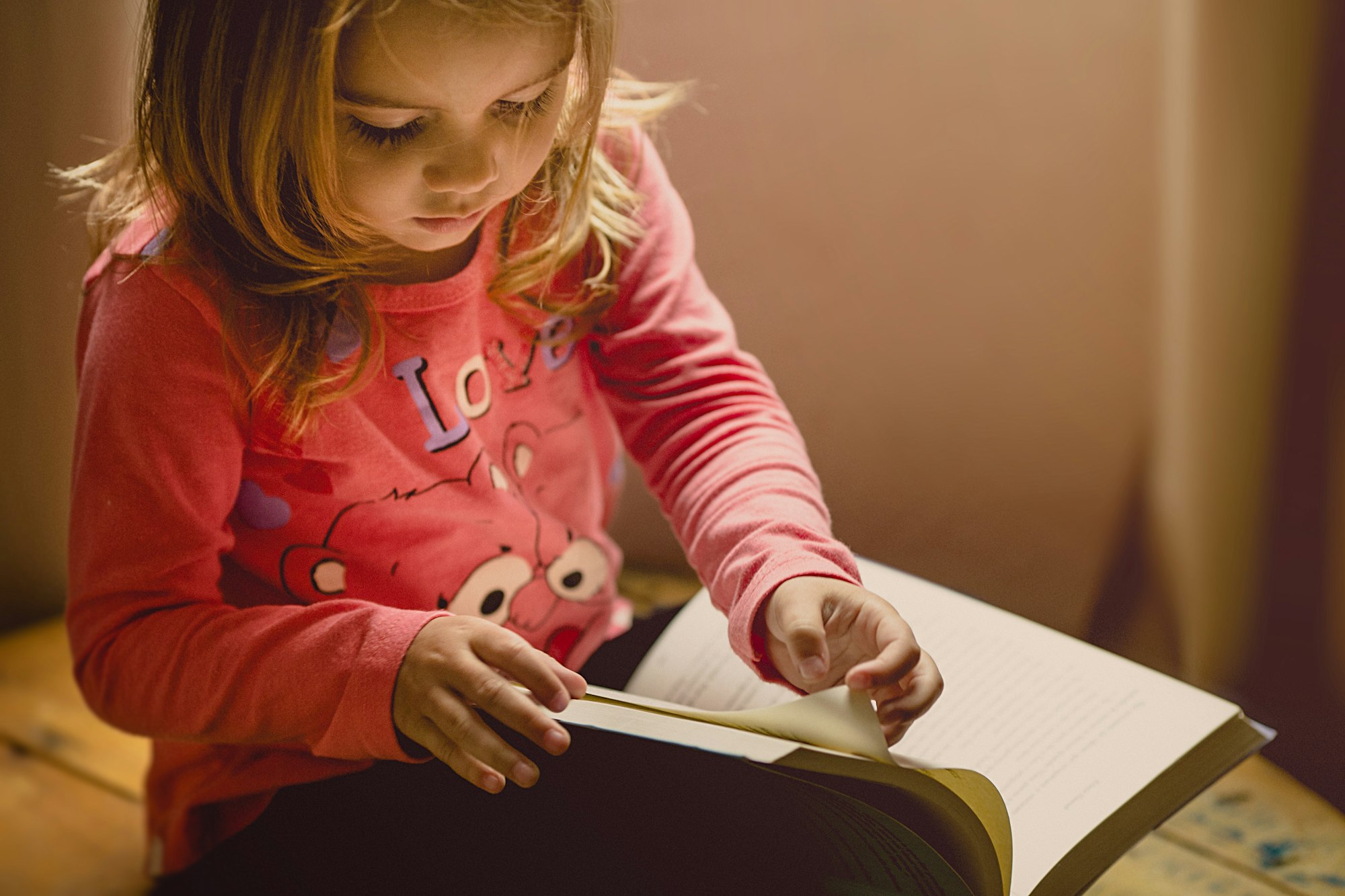My child HATES reading | top 3 tips to get your reluctant reader to love books
Is your child a reluctant reader? They whine when it’s time to read or they only read one book. This video gives you simple tips to get your child to love reading, Whether they are 6 or 16, these tips will help your child become a confident, voracious reader!

Is your child a reluctant reader? They whine when it’s time to read or they only read one book. This video gives you simple tips to get your child to love reading, Whether they are 6 or 16, these tips will help your child become a confident, voracious reader!
Get your free parent teacher conference checklist!
https://primaryfocus.tv/free-download...
3 books all rising kindergarten students should read: https://primaryfocus.tv/3-books-all-r...
Chapter Books You'll Actually Want to Read with Your Kids: https://primaryfocus.tv/great-chapter...
** Great books and resources for kids (contains affiliate links) **
Reading Finger Eyeballs: https://amzn.to/3sqwjiZ
Witch Reading Finger: https://amzn.to/3QSDZnv
Reading Lanterns: https://amzn.to/3SCIMLc
Captain Underpants Series: https://amzn.to/47sUCvy
Unicorn Academy Series: https://amzn.to/3u40Zqy
Dog Man Series: https://amzn.to/3szTLdt
Junie B Jones Series (kindergarten): https://amzn.to/478Fvrp
Junie B Jones Series (first grade): https://amzn.to/4757W9B
Transcript: Hey, Natalie here. Welcome back to Primary Focus. Is your kiddo a reluctant reader?
Maybe they whine every time that it's time to read, they're resisting it. Or they're that kid who, yeah, they technically read, but it's just one book. And it's the same book every time, you don't think that they're reading it. They've got every single page memorized.
Having a child that's a reluctant reader can be so frustrating because reading is one of the most important skills they will learn in their life. When I was teaching in elementary school, I worried a lot about my reluctant readers. It affects their self esteem, and as time goes on, it affects their school performance in all subjects. It's important that kids enjoy reading and that they grow to be strong, confident readers.
There are ways to turn this around, though. One thing I love to do is let kids experience reading in fun places, like under the table or in a pillow fort. But it's going to take a concerted effort by your family to make this happen.
Kind of a top secret plan to get your child to love reading.
So I've got three tips for you to help your child love reading Before you look at your child and address their actual reading skills and what they need, take a look at their environment. Consider what's going on with your home, your family, with their peers and at school.
Show them that you are a family that reads. Always have books around, magazines. Show them that you're reading text messages. Turn on captions on the TV. ensure that your home is a text filled place. I know a lot of us are reading on Kindles and other e readers now, take a break from that e reader and just go back to a good old fashioned book for a while.
I think sometimes because children are reading physical books, they don't connect that when we are on our e readers that we are also reading. So if you can kind of just show them a chapter book, and, I mean, kids love the glitz and glamour of a 300 page book.
It looks so exciting to them. This goes for magazines, even the newspaper. Just show them that there are fun, exciting different ways to be reading.
We are texting all the time. I think children really want to have access to those text messages and access to the emails. Even though those are grown up, mundane things for us, these are things that kids don't experience. So if you can kind of just... Advertise how important the reading of this is, read a text, or if a text comes in talking about them, show them that text message, give them that kind of thrill of getting a nice text or an email that involves them.
The next thing is you want to consider what is appropriate for your child's age. Children get about 2 3 minutes of attention span per year old. So, if you're working with your six year old child, six times two is twelve minutes. maybe you can get them up to eighteen minutes if they're really interested in what's going on, a child has an attention deficit, they are not interested, or what's happening is not in their native language, you can go ahead and dial those minutes way back.
I say this because if you are asking your child to sit down and read for 30 minutes and they are 6 years old, even for a really strong reader, that is a really long amount of time.
They will get tired from reading. Reluctant readers do not have long term endurance for this. So I would start letting them independently read for maybe only a couple minutes at a time, depending on their age. You could take turns reading as well, you read a page, they read a page, or if they're not reading that fluently yet, let them just pick up the words that you know they can read.
Some children that are reluctant readers can read, they just don't like to, and then a lot of children that are reluctant readers are actually behind, and their frustration with reading is keeping them from growing. So you want to get a really clear idea of where your child lands and what kind of books are appropriate for them to be reading.
And then from here you want to make books available. If you don't already, get a basket of books, a little bookshelf of books. You can get free books really easily going around the neighborhood, going to thrift stores, asking people for donations. A lot of people that you know probably have books that their child for.
And just try and have a text rich environment in your home.
Get your friends and family in on it too. If they are spending time at somebody else's house, ask them if they can build in some reading time the more that they are seeing their peers and people that they love, people from outside the home reading, it just rubs off on them and it feels like, oh, this is something everybody else is doing, and maybe I need to be a part of this too. have empathy for your child. Reading is hard. It is not natural. If you keep an eye on education news, scientists and teachers are constantly in argument about the best methods to teach reading. And it's just so interesting to think that reading and writing has been prevalent for thousands of years, and yet we still don't fully understand the best way to teach it.
Keep that in mind as your child is learning to read. Reading and writing is not natural. It's not like walking or learning to eat. These are things that people have created, humans have created, and are constantly evolving.
You want to check in with their teacher too to see if there are specific skills that your child is already really good at and things that they need to work on as well.
And while you're talking to their teacher, make sure you use my parent teacher conference checklist. This free download is a simple guide to ensure that you've asked all the right questions of your child's teacher. The link is in the description below.
The second thing to consider is that you want to make reading interesting for your child. you want to give them a comfortable space to read. So homework might be happening at the kitchen table, but reading doesn't necessarily have to be there.
Let your child experience what it's like to read on the couch, read on the floor, get in a pillow fort and read. Reading is the kind of thing that you can do in bed, you can do in a car, so let your child have that. But this is what I ask of you.
Your child needs to maintain some sort of a reading posture to them. And this will be particularly important if your child is still at a young reading age where they need to use their finger to track the words. so what I don't want to see is a child laying on their back holding the book up in the air. But what they can do is maybe lay on their stomach, propped up on their arms, and then they can still use their reading finger. Same thing, they might be sitting in a fun chair, to maybe have the book sitting in their lap, so that they can have their reading finger going. Also, you want to make sure it's not too comfortable, because if they fall asleep, we've defeated the whole point.
To keep reading fun, make a treat out of going to the library or bookstore. If your child earns a reward, maybe you can start giving them library time or buy them a book as a reward. Some actual accessories that I like to have, like a reading flashlight is fun, especially for older kids that don't have to use their reading finger as much.
A physical reading finger, like little witch finger that you could get on their hand, or those little eyeballs that hug their hand.
your child doesn't just have to be reading old fashioned books. Comic books and graphic novels have become really popular. Magazines as well, there's a lot of great children's magazines. Audiobooks. There's probably a lot of people who have good old fashioned books on tape sitting in their basements with books that your child will still know and love.
And then get your child hooked on a series or a genre. I would take them to an actual bookstore or the book fair, something like that, to do this. There are so many kid series where your child can dive in and there's 10, 15 books about this character. If you can get your child hooked on a series, that is going to be your best bet.
People talk about how controversial things like Captain Underpants are, but the reason why that book remains popular is because kids eat them up. And if they're reading, then they're reading. I've linked in the description to an article below that has some great series broken down by age.
Now, let's talk about if your child is stuck on one book. Some kids like to read the same book repeatedly, especially picture books. And if they are stuck on that, it can be really hard to get them to pick out other books. what I would do first is take them somewhere else to read.
if you're always reading at home in your house. Take them to the library, take them to the park, take them to somebody else's house and do some reading there. Just get them out, away from this book, and don't bring that book with them. This book has clearly become part of their comfort zone with reading. So some coaxing is going to be necessary.
Don't take this book that they love away from them, but maybe you can encourage them to read a new book first and then the book that they love the most second. diversify what they're getting.
Here's what I want you to do on your own. Look for some sight words or vocabulary words in that book.
Make note of them and find another book. That has similar words in it, too. Then, go through the book that they love. Have them make a list of some of the sight words, and see if they can match them and find them in the new book. And as you do this, keep a tally of how many times those words appear. Put little check marks on it.
Just something to show, like, wow, if I can read these words here in this book, then I can read them anywhere.
And number three, you want to make reading a habit.
Ask friends, family, and babysitters to be reading with them. You wanna read frequently, not just for homework. Some kids are motivated by reading logs and by charts and competitions, but if they're whining about this, I would hold off.
Reading logs and competitions are fun if they're achievable, focus on making a routine first so that reading feels more natural. What you ultimately want is your child to know that if they've got nothing to do, picking up a book is a great option for them.
At restaurants, doctor's offices, any other place where you may need to wait, burn a little bit of time, have some books or printed texts, maybe a magazine, instead of bringing the iPad. Even if they aren't reading and instead they're doing a crossword puzzle, a word search, or a coloring book. You want them to feel used to grabbing a book instead of grabbing electronics or toys.
Well that's my advice for reluctant readers, but I'm curious what advice you have. Share in the comments below. Don't forget to download your free Parent-Teacher conference guide. My name's Natalie. Thanks for watching Primary Focus. See you next time.

